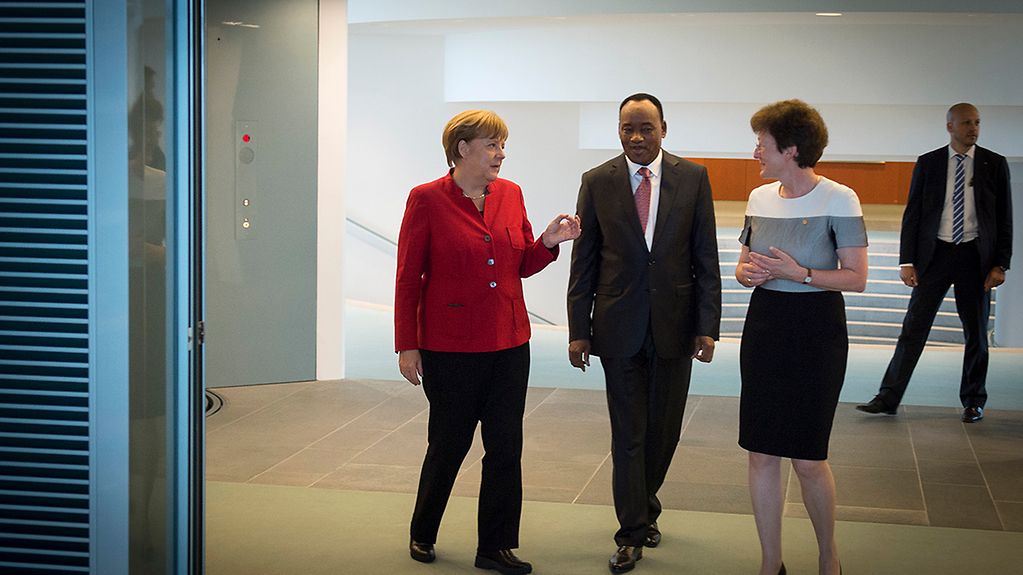Niger's President in Berlin
Germany is to increase humanitarian aid for Niger, announced Chancellor Angela Merkel following her meeting with Niger’s President Mahamadou Issoufou at the Federal Chancellery. In future the two countries also intend to cooperate more closely in the fields of business and education.
3 min reading time

The Chancellor promised Niger's President more financial assistance
Photo: Bundesregierung/Bergmann
Niger, one of the world’s poorest countries, is currently facing enormous challenges – poverty, droughts and other climate-related problems, and terrorism. To prevent these problems becoming even more acute, Germany intends to support the country, said Chancellor Angela Merkel after talks with President Mahamadou Issoufou. "We will ensure not only that Germany increases bilateral humanitarian assistance, but that the World Food Programme, the United Nations Office for the Coordination of Humanitarian Affairs (OCHA) and other organisations working on the ground have the resources they need," she stressed.
The German government also intends to step up assistance in the education sector. Education for girls is particularly important. "This is key to ensuring that the people benefit from economic growth and to prevent very young girls marrying," said Angela Merkel.
This was President Mahamadou Issoufou’s second visit to Germany. The Chancellor welcomed him to Berlin for the first time in May 2013. Before his talks with the Chancellor, Mahamadou Issoufou met with representatives of the Kreditanstalt für Wiederaufbau, and following his meeting at the Federal Chancellery, he met with Federal Foreign Minister Frank-Walter Steinmeier.
Support in the refugee crisis
Niger, which borders on both Mali and Nigeria, is the most important transit country for refugees, and has been hard hit by the migration flows. "Niger is on the principal route of migrants heading for Libya. About 120,000 people a year make their way along this route," she stressed. That is why it is right to set up reception centres in line with the Valletta Plan agreed at the last EU-Africa Summit, which are to offer refugees and migrations way of returning home. "Three centres are to be set up, but we are still a long way from achieving this target," said the Chancellor.
President Mahamadou Issoufou also underlined the importance of reception centres. He did, however, point out that the effectiveness of these centres will depend on there actually being options for refugees to return home.
Improving stability in the region
The difficult security situation in the region is also disrupting the supply of basic essentials in Niger, underscored the Chancellor, which makes the engagement of the Bundeswehr in Mali all the more important. "This impacts directly on Niger – if there is greater stability in Mali it is helpful, if stability in Mali declines, it is a problem for Niger," she said.
Commenting on efforts to fight terrorist organisations like Boko Haram, which are a threat to the country’s internal stability and indeed to stability across the region, the Chancellor said, "The European Union is helping here with a Multi-National Joint Task Force in the Lake Chad area." The German government will work to ensure that the necessary resources are deployed where they are needed, she said.
Stepping up development cooperation and economic cooperation
In order to strengthen economic cooperation, private-sector engagement is to be stepped up in future. To this end, there are plans for transnational infrastructure measures, like railway and road projects, that will connect countries. "The states of Europe should consider whether they can step up their engagement here," underlined Angela Merkel.
Niger’s President also pointed to the need to finance the humanitarian and development measures and to the need for private-sector engagement. "There will be no development without security, and no security without development," he declared.
Germany’s engagement in Niger focuses primarily on development cooperation, creating security and stability, and promoting democracy, the rule of law and human rights. The current level of pledges make Germany the country’s third largest bilateral donor. Last year, assistance was agreed in the health sector. In additional to state development activities, the German government also provides financial support for the work of German non-governmental organisations operating in Niger.